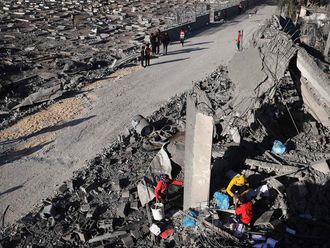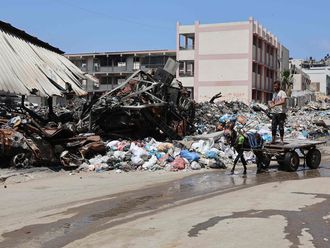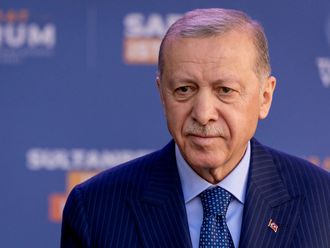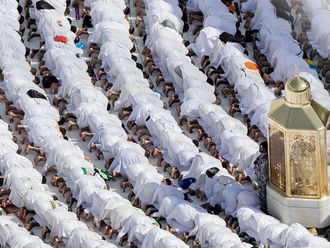Washington: Secretary of State John Kerry will fly to Switzerland on Sunday for the next round of talks over Iran’s nuclear programme, amid soaring expectations that a historic agreement is imminent.
A cascade of signals from Washington and Tehran suggest the governments taking part in the talks believe they can reach a framework for a deal by late March despite domestic opposition.
In Iran, senior ayatollahs, including Supreme Leader Ali Khamenei, have praised their often-criticised negotiators as patriots working for the good of the country.
Kerry, who has invested a huge amount of effort in direct talks with Foreign Minister Mohammad Javad Zarif, recently stopped in the Gulf to prepare wary Arab allies for what appears to be the coming deal with their arch foe.
Perhaps tellingly, the US delegation for the upcoming talks includes an additional member. Joining the usual experts on sanctions, arms control and nuclear proliferation will be Alan Eyre, the State Department’s Persian-language spokesman, whose outreach to Iranians has him fielding questions in fluent Farsi on Facebook and Twitter.
A quirk of the calendar could lend a resonant touch to an agreement now, coinciding with the Persian New Year, an important Iranian national holiday marking new beginnings.
While officials have cautioned that a comprehensive deal is not assured, the signposts point to negotiators announcing some sort of general agreement soon, leaving technical details to be worked out by the end of June.
“They’re very close,” said the Iranian-born Trita Parsi, president of the Washington-based National Iranian American Council. “Momentum is on the side of an agreement being reached. The political capital the two sides have put into this is overwhelming, and would be very, very difficult to walk away.”
The talks over Iran’s nuclear programme began more than a decade ago and proceeded in fits and starts until Hassan Rouhani was elected president of Iran in 2013. In a country staggering under high unemployment and inflation, Rouhani campaigned on a promise of relief from sanctions.
Dozens of sanctions on Iran have been imposed by the US, the European Union (EU) and the United Nations (UN). They helped bring Iran to the negotiating table, but the timetable for easing them has been one of the main hurdles to finalising a deal.
Although Kerry has been the most active diplomat involved in talks with Iran, the negotiations are not being conducted by the US alone. The five permanent members of the UN Security Council — Britain, France, China and Russia as well as the US — plus Germany, all have a say.
And although Congress and the Obama administration have been locked in a dispute over when US sanctions would be lifted, the US has little or no control over many of the current economic restrictions that have been imposed on Iran by the UN and Europe.
It will fall to the UN Security Council to vote on lifting its sanctions, mostly involving bans on Iranian exports, travel limits on government officials and asset freezes.
Some countries with political and economic ties to Iran, most notably Russia and China, have balked at additional sanctions. Some European countries are eager to resume business with Tehran.
US President Barack Obama can temporarily grant waivers on US sanctions, but only Congress can permanently lift them.
The administration wants to phase in sanctions relief only when inspections show that Iran is not trying to expand its nuclear programme from energy production to develop a nuclear weapon. The bureaucracy that keeps an eye on Iran compliance would stay in place, so sanctions could be “snapped” back into place if it cheated.
Some critics of the emerging deal say they fear Iran will be left with a large nuclear programme and its bomb-making capability intact.
“The entire deal is a bet on verification,” said Mark Dubowitz, an Iran expert who is executive director of the Foundation for Defense of Democracies. “And I’m deeply sceptical that the sanctions relief structure we’re putting in place, which is highly dependent on snapback sanctions, is at all workable. I fear over time we will lose our economic leverage to enforce Iranian compliance.”
But others say the impact of more sanctions, as supported by some members of Congress, would be minimal.
Richard Nephew, a Columbia University scholar who was deputy sanctions chief for the State Department through last year, argues that Iran has diversified its economy through cement and autos, and built up its cash reserves.
Israeli Prime Minister Benjamin Netanyahu’s speech in Congress railing against an emerging agreement, and an open letter from 47 Republican senators warning Iran’s ayatollahs they would modify any deal signed by Obama, would allow Iran to blame the US if talks fail, Nephew said. That frees other countries to abandon sanctions before Washington.
“I’m concerned that the world increasingly will look at us as the ones who are unable to come to yes,” he said.
Tehran already is building that case, even as its leaders signal they are ready for a deal.
Khamenei, who would have Iran’s final word on any deal, termed the GOP letter a sign of American decline and duplicity. And he backed Iran’s negotiating team, calling them “good and caring people who work for the country.”
Ayatollah Mahmoud Shahroudi, often mentioned as a successor to Khamenei, said Iran’s negotiators “are seeking to advance national interests, and we support them.”
What comes out of the talks in Switzerland may ultimately be vague. Kerry wants a signed understanding on agreed principles before moving on to technical details. Khamenei prefers a one-step arrangement.
Either way, the window is closing for a durable deal.
At a news conference on Saturday in Egypt, Kerry said the ultimate goal is to guarantee that Iran’s nuclear programme will be “peaceful now and peaceful forever.”
Cliff Kupchan, an Iran expert who heads the Eurasia Group, a consulting firm, said he is optimistic about a framework agreement. “But I think the chances for a final deal are about 40 per cent. There are still significant gaps on both sides. If they can’t close the gaps, I don’t know what three more months is going to do.”












